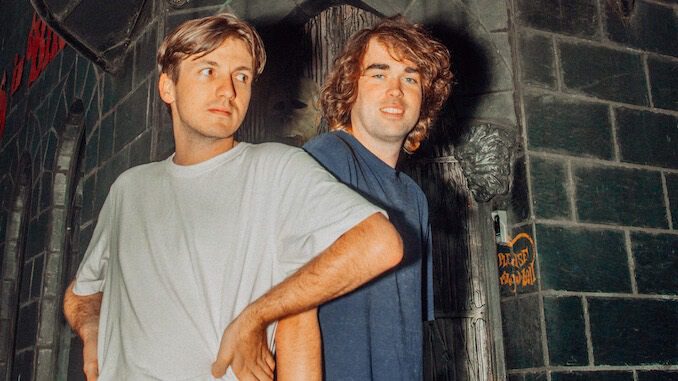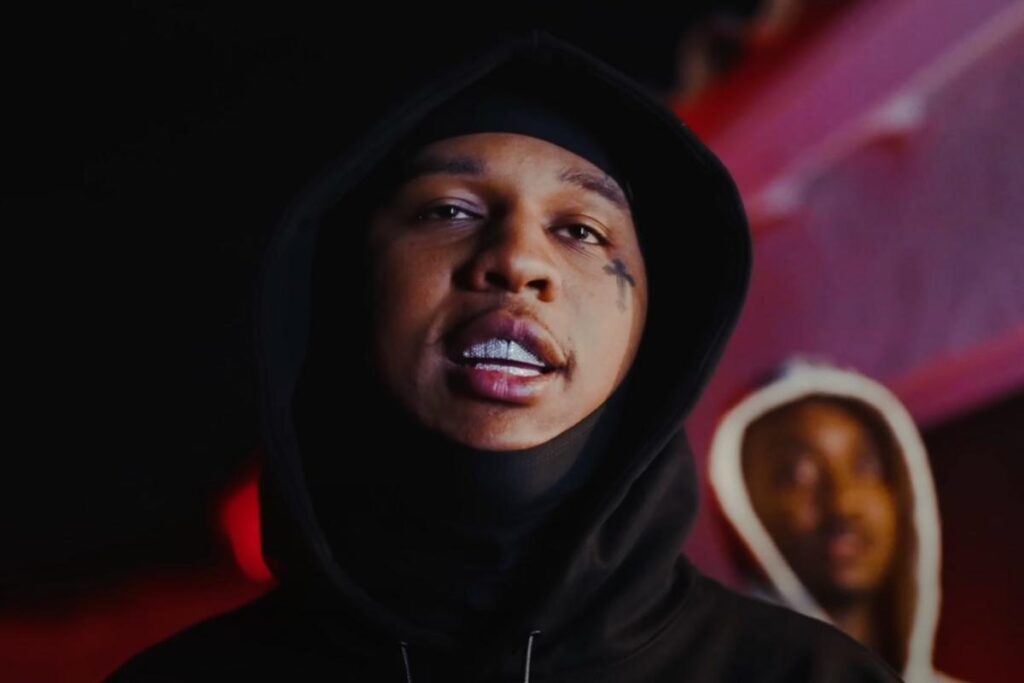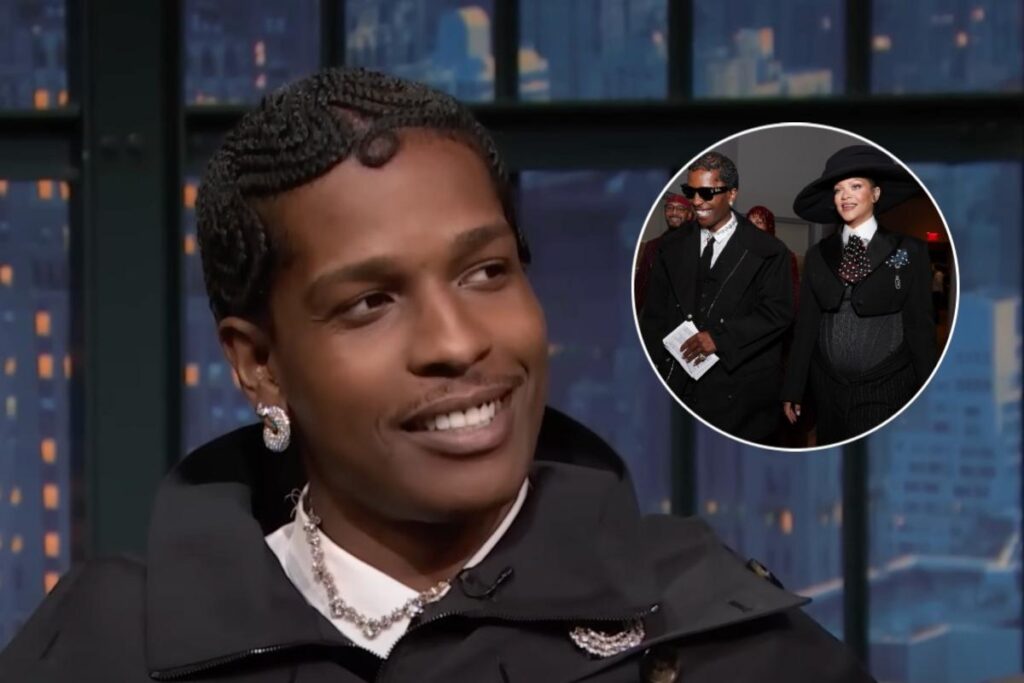Stefan Blair and Liam Parsons can’t tell you exactly how long they’ve been performing together. They’ve shifted between bands, independent music-making and their indie-rock venture, Good Morning. They’ve concocted a scrappy blend of jangle pop, folksy ballads and noise rock with a cool-kid DIY flair. They’ve been sampled by A$AP Rocky, released four EPs and just joined Polyvinyl Records. Though the two have only performed as Good Morning for about seven years, making their debut with 2014’s Shawcross, they still feel young, just much wiser.
Recently releasing their first album on Polyvinyl, Barnyard, the Australian duo find themselves in a more clean-cut space, with an engineer and a crisper finish. Don’t fear—their intimate, homemade sound isn’t compromised. It’s just the subtle metamorphosis of a group unafraid to try something new. But who knows if it’s going to stick—Blair and Parsons don’t like to do the same thing twice.
Their first release since 2019’s The Option and Basketball Breakups, Barnyard was recorded in The Loft, Wilco’s studio in Chicago, before the world broke out in utter chaos—or rather became more chaotic than usual. The album’s tracks are more overtly anxious and still slyly political, making them fare well two years after the recording process. On “Burning,” they sing of unease and dread due to the state of the world, with a laid-back demeanor and delicate, fuzzed pep that makes the duo sound both frustrated and matter-of-fact, as if these emotions are not opinion-charged, but merely common sense. Opener “Too Young To Quit” steadily drifts into a haze of guitar strumming, but packs a punch by the first two lines: “Where to begin? / Which concern is more pressing—the brain or the breathing?” Good Morning may have never been so direct. The duo think their songwriting has improved, and Barnyard affirms it. We caught up with the band to talk about their new album and everything that went into it.
Paste: For both of you, I read somewhere that you’ve been together working on music for about a decade now. Is that true? I know the first EP took a while.
Stefan Blair: I guess, in a general capacity that’s true. Not as Good Morning, but we’ve been playing music together since high school, through other bands. Yeah, ten or 11 years or so. But Good Morning itself, maybe about seven years?
Liam Parsons: Yeah, It hasn’t felt like a long time until, like, people say, “You’ve been together for a long time,” and then I’m like “Oh shit! Alright.” I guess we have.
Paste: With that long time, separate and with Good Morning, how do you feel like your sound has changed or formed? Because obviously when you were playing together, it was different from having a name and releasing work.
Parsons: I think our interests and tastes have developed a bit. And also, I hope, our songwriting ability has. I feel like there’s lots of people that may disagree with that and just like our early music, which is fine, but that’s probably subjective. I personally think, and I think Stefan does too, that we’re better songwriters now, which is what we want. It’s sort of slowly plugging away at it over time. I’m not sure I have a perspective yet, though.
Blair: I feel like there’s a bit more consideration put into it these days. Because a few years ago, we’d write a song in a few minutes. Speaking for myself, early Good Morning, lyrically, was just so lazy. We’d find a phrase and just repeat that. Maybe there is a bit more consideration to it these days, with the knowledge that it could be something that may be released and it will exist there forever. I don’t want to look back on it forever and be embarrassed. So, just trying to avoid that as much as possible.
Parsons: It’s a fine line because I always get more embarrassed by things I’ve worked harder on. Inevitably, I’m not going to like it at some point. It’s just natural, at some point I’m going to be like, “that fucking sucks,” so I will probably be more embarrassed by something I can recall sinking some time into. At some point, you have to take it a little more seriously and just hope that you won’t hate it as much later.
Paste: So, what’s maybe the thing you are most embarrassed by now? Or, the least embarrassed?
Blair:
Shawcross.
Parsons:
Shawcross!
Blair: Why is that record … yeah. That would be the main one for me. I feel like I can find something charming in the Good Morning records after that, depending on what it is, but that one is probably my biggest point of embarrassment.
Parsons: I think they all have things that are bad. I shouldn’t say bad, I don’t want to talk shit about myself. My therapist would be very upset. They all have redeeming features in a way, and ones where I think, “What the fuck is that?” Stefan, I don’t really like Shawcross either, but I can see what we were trying to do, I can see the logic there. The 2014 us logic.
Everything has its ups and downs. I think we were talking yesterday about the record Basketball Breakups, which is kind of the only one where we’re like, “Yeah, nice.”
Paste: Well, I mean, with that, you have these older EPs that have been released that sound different, either lyrically or sound-wise. You spoke about lyrical quality changing over time. Have you seen certain things stay the same in terms of your sound?
Blair: I think there’s a lot. It may not sound as obvious to people who aren’t Liam or myself, but there is an active effort to not repeat yourself. I think there’s a through line to how Good Morning sounds as a band. Maybe in my head I think it is more diverse than what it actually is, but we don’t want to create something we’ve already done. I’m not sure if that’s a development of sound but we don’t want to repeat.
Parsons: A lot of our records were made differently. Every record has been made differently. In a different place, a different kind of method. That’s what we’re interested in, more so than going in and thinking, “This record is going to sound like this.” The process changes, and hopefully, that will keep it fresh enough.
I’m sure half the people will think it sounds exactly the same. But it’s how we got there that changed, and kept it exciting to work on.
Paste: Your latest release, Barnyard, was recorded in Chicago, at The Loft. What made you choose that space and city?
Parsons: We wanted to do a studio record, work with an engineer, not record everything ourselves and get out of Melbourne. And we knew we’d be going on tour in America and we’d have to work somewhere. It was really just thinking of places we liked. I think the The Loft was the first place we tried, and it’s just worked out. The chips just fell in the right way. Neither of us had been to Chicago before that, although we did play a show there before, on the tour. In a way, it has a similar energy to Melbourne, which is sort of funny. If Sydney is L.A. or New York, we’re like the smaller city with worse weather. A lot of music we like has come out of there, and out of the studio, too. It was just a no-brainer.
Paste: Did you see this album as more of a reflection or reminiscences of your younger self, or more of a looking-towards-the-future album? I saw parts of both, and I wonder if it went more one way on your end.
Blair: I think it’s hard to answer for the whole record. There’s two lyricists within the group, and I think for the record we put out there usually isn’t a large overarching theme. This one has songs that we’ve had for a five- or six-year period. Song by song, a lot of it is reflective, but I wouldn’t say the whole record is.
Paste: In terms of the creative process for the album, how long did this album take and how did it really develop?
Parsons: The actual recording process took five days, Monday to Friday. Prior to that, we get together once a week and share songs. We have a small studio space with some friends, and bring in songs we’ve written to see what the others think, maybe work on it together, finish it together, or write a song on the spot. But it was more of an effort to make the demo, it being more collaborative than it had been in the past couple of records. We had a big stockpile of songs, and most of them were pretty new, but we didn’t really know until we got to the studio in Chicago what we were going to record that week. We started picking them out as we went. I’m sure if we were in a different mood on Monday morning of that week, the record would be different. There were a couple of songs that were started and finished in that space.
Paste: Which tracks were the ones you had previously?
Parsons: “I’ve Been Waiting” is an old one, we’ve done a few versions before. And “Country,” as well. I did a version of that by myself, but we never recorded it as Good Morning.
Blair: We tried to put it on an album before.
Parsons: Stefan, is that all?
Blair: I think that’s the only two. The other ones were, like, from that year.
Paste: Detouring back to the idea of lyrics, there were a lot of hefty themes that I think maybe weren’t as weighty in your past work, and I was wondering how you tackled those ideas without overtaking the tracks, if that makes sense. It was really great how sometimes the tracks were so lighthearted, and there was a great balance.
Parsons: Thanks! For me, it feels like we may have always talked about those things and they’ve always been a part of our music, but I think the lyrics weren’t as coherent. We sort of talked about those things cryptically and weirdly insular instead of in a self-directed way.
Blair: I think a lot of it was getting the confidence. I used to be terrified of getting the words out and knowing people could understand them, and trying to be emotionally honest in songwriting. It terrified me for a long time, thinking, “What if certain people listened to this, what would they think of me?” But these days, I think I care less about what people think if they listen to it. I like the idea of having an avenue where you can write about things and be honest, and show emotion.
Paste: What’s your favorite track from the album? If you can choose one, of course.
Parsons: I like the first song a bit, “Too Young To Quit.” It’s got a nice palette to it. I like the synths at the end.
Blair: I feel like my favorite, and it has been for a while, is “Matthew Newton.” That’s a good one.
Paste: Do you think there were any “lightbulb” moments that gave you the emotional clarity you wanted to portray in this album?
Parsons: This sounds corny, but I think it’s age. Doing it for a few years, we’ve been doing it for a decade, or more than a decade in some capacity now. It’s just getting slowly more comfortable with sharing yourself in different ways, realizing that the world doesn’t end if you say something in a song, nobody may notice or care. It’s slowly growing more comfortable with how you portray yourself.
I think also it’s just the direction the world is in for the past few years, and currently. You can’t keep it out of your music and lyrics. The state of the world will always affect it in some capacity, and let itself in somehow. So you may as well deal with it.
Ana Cubas is a music writer based in New York, who also occasionally dabbles in film reviews. Her focus is arts and cultural criticism.




